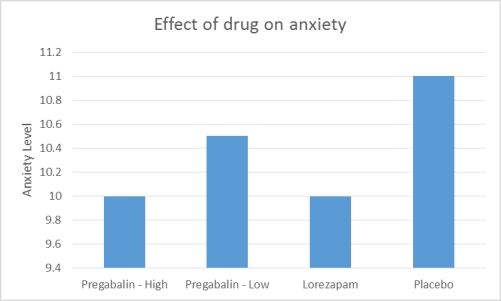Use the following to answer questions
Scenario I
Scenario I is based on fabricated data inspired by the following study:
Pande, A. C., Crockatt, J. C., Feltner, D. E., et al. (2003) . Pregabalin in generalized anxiety disorder: a placebo-controlled trial. The American Journal of Psychiatry, 160(3) , 533-540.
Effect of Pregabalin on Anxiety
Pande and colleagues examined whether pregabalin (brand name Lyrica) was as effective as lorazepam (brand name Ativan) in treating anxiety. To that end, they administered either a low dose of pregabalin, a high dose of pregabalin, lorazepam, or placebo to participants for four weeks, then measured the participants' anxiety using the Hamilton Anxiety Rating Scale. The researchers found that not only did the high dose of pregabalin significantly reduce anxiety, but that it also reduced anxiety as well as lorazepam. The results of the study (Figure 1) indicate that pregabalin may be an effective alternative to lorazepam to treat anxiety in adults.
 Figure 1. Hypothetical results of Pande et al (2003) showing the impact of each treatment on anxiety level. Anxiety was measured using the Hamilton Anxiety Rating Scale.
Figure 1. Hypothetical results of Pande et al (2003) showing the impact of each treatment on anxiety level. Anxiety was measured using the Hamilton Anxiety Rating Scale.
-(Scenario I) Patty was a participant in the study described in Scenario I. She told her friend she volunteered because she suffers from social anxiety and thought her participation might help her. Patty appears to be motivated based on:
Definitions:
Absolute Advantage
The capacity of a nation, person, corporation, or area to generate a product or offer a service at a per-unit cost that is cheaper than the per-unit cost at which any other party produces the same product or service.
Frederic Bastiat
A French economist, writer, and prominent member of the French Liberal School in the 19th century, known for his advocacy of free trade and the critique of socialism.
Absolute Advantage
The ability of a country, company, or individual to produce a good or provide a service more efficiently than competitors, using the same amount of resources.
Nigerian Worker
An individual from Nigeria who is engaged in employment or labor activities, contributing to the country's economy.
Q1: As put forth in the textbook,"Those who
Q2: When is the ethical review of a
Q5: May believes that wearing perfume makes women
Q5: Which of the following is designed to
Q7: Dr.Turpin is a social psychologist who teaches
Q10: (Scenario II)The level of IRB review most
Q13: What is the hindsight bias and when
Q15: What is the law of small numbers?
Q66: Malcolm is a researcher who wants to
Q74: Nonempirical research is to empirical research as:<br>A)